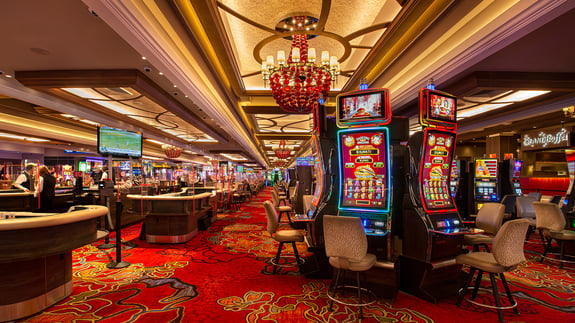
Casino experiences have captivated players over the ages, progressing from basic recreational activities to sophisticated forms of entertainment that blend fortune, tactics, and amusement. From the historical origins of gambling in societies including the ancient societies of Mesopotamia and Rome to the glitzy corridors of contemporary casinos, the history of these games reveals much about human nature and our relationship with risk. https://ga179.xyz/ As cultures blended and technology has advanced, casino games have changed, illustrating the changes in society and innovations in gameplay.
The initial iterations of gambling likely included elementary dice-based games and wagering on the results of sports competitions. Through the years, these basic forms of gambling grew into more complex games like card games, roulette, and the variety of slot games that populate the premises of casinos today. Each period brought its own set of rules, visual styles, and sociocultural significance. Today, casino games maintain their evolution with the rise of digital gaming platforms, enabling players from everywhere to engage in a common experience, further blending the traditional with the modern era.
Initial Origins of Gambling Games
Gaming activities have origins that extend back to old societies, where betting was deeply entrenched in social traditions and cultural rituals. The initial known instances of betting emerged in Mesopotamia around 3000 BC, including simple dice games made from knuckle bones. These primitive games laid the foundation for more advanced betting games, demonstrating humans’ instinctive urge to find fortune and entertainment through chance.
As societies developed, so did their gambling interests. In ancient Chinese culture, around 2300 BC, tiles were unearthed that looked like early basic versions of a lottery game game. More structured forms of gambling arose in the Roman Empire, where games of luck were a popular pastime, often occurring in community gatherings. The Romans developed multiple wagering games, which composed dice and board activities, highlighting the pervasive nature of gambling across different social classes.
With the passage of years, these early games shaped the progress of modern gambling games. In the Middle Ages, playing card activities emerged prevalent in European culture, paving the way for the organized gambling venues we know today. The transition from casual gambling to formal gaming in taverns and personal houses marked a significant shift in how people engaged with activities of chance, leading to the subsequent creation of casinos as specialized places for betting.
The Growth of Contemporary Casino Gaming
The late 20th century marked a significant change in the world of casino games, driven by technological advancements and shifts in cultural attitudes towards betting. The emergence of computers and the World Wide Web altered the way players engaged with their beloved casino games. Online casinos emerged, enabling gamers to enjoy classic table games like poker and blackjack from the comfort of their homes. This emerging online environment not only broadened access to gambling options but also drew in a fresh audience who found the comfort and variety attractive.
As digital gambling gained popularity, so did innovations in gaming technology. The creation of advanced software and graphics transformed classic gambling games into immersive experiences. Gamblers could now connect with authentic dealers through real-time broadcasts, importing the feel of physical casinos directly into their homes. This fusion of in-person play with online platforms created a novel combination that elevated the community element of playing, making it possible for individuals to engage and challenge with others around the planet.
Moreover, the growth of mobile gaming significantly changed the gambling environment. With the widespread use of mobile phones and tablets, players can access their beloved casino games at any location, at any time. Mobile apps offer a wide selection of options tailored for touchscreens, catering to the fast-paced lifestyle of modern users. This accessibility has resulted in increased engagement in gambling, fostering the exponential growth of the gaming industry. As a result, the prospects of gambling continues to develop, adapting to new technologies and shifting consumer preferences.
The Impact of Technology on Casino Games
Technology’s advancement has greatly changed casino games, enhancing the overall experience for players for gamblers globally. As the internet emerged, online casinos emerged, allowing players to play their preferred games from the safety of their own homes. This shift not only made casino games more accessible but also increased the variety of games offered, as online platforms could host numerous variations of traditional games without the limitations of brick-and-mortar establishments.
The rise of mobile technology further revolutionized the casino gaming landscape. With the proliferation, players now have the ability to play casino games anytime and anywhere. This mobility has resulted in the creation of dedicated mobile applications and optimized websites that provide seamless gaming experiences. Additionally, advancements such as live dealer games have brought the genuine feel of a casino into players’ living rooms, connecting between physical and online gaming.
Moreover, advancements in artificial intelligence and virtual reality are paving the way for the next generation of casino games. AI improves game design and player interaction, creating tailored experiences based on user behavior and preferences. Meanwhile, virtual reality provides immersive environments where players can interact in a virtual casino environment, making the gaming experience more exciting and realistic. As technology continues to evolve, the future of casino games seems bright, filled with endless possibilities for innovation and entertainment.